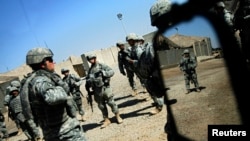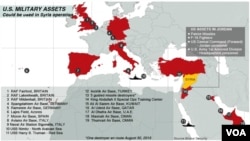If the United States launches missile attacks on Syria in retaliation for its suspected use of the nerve agent sarin against anti-government rebels, it will be just the latest in a long series of U.S. foreign military operations. What would be unusual is that President Barack Obama is seeking congressional approval ahead of the attack.
Previous presidents have gone to Congress for declarations of war after the country was directly attacked, such as by Japan at the start of WW II. But more often, American presidents have acted on their own, using their authority as the country's constitutionally designated commander in chief. In that capacity, they have acted without congressional approval to send troops abroad, engage in bombing attacks, or dispatch U.S. military personnel to work with international allies.
By some counts, the U.S. has been involved in more than 50 significant military actions in the last half century - an average of more than one a year - ranging from significant fighting in Vietnam, Iraq and Afghanistan to lesser incursions in such far-flung countries as Kuwait, Bosnia, Pakistan, Libya, Grenada, Haiti and Panama.
That total does not count more limited U.S. actions, such as drone strikes it now is carrying out against suspected Taliban insurgents in the Middle East.
In its 237-year history, the U.S. has often deployed its troops. History has recorded the U.S. as the victor in two world wars, but its overseas military ventures have not always been as successful.
U.S. forces fighting under the U.N. flag in Korea in the early 1950s left with the peninsula split into a communist North and a democratic Korea, a tense outcome that endures to this day. In Vietnam, the U.S. withdrew its last troops in 1975 after more than a decade of military involvement, allowing a communist government to seize control.
History has yet to cast a verdict on this century's U.S. wars in Iraq and Afghanistan.
U.S. troops ousted Iraqi President Saddam Hussein in the Iraq War from 2003 to 2011, but allied forces never found the weapons of mass destruction they believed he was harboring. U.S. and allied forces are still fighting insurgents in Afghanistan, but Obama plans to withdraw American military personnel by the end of 2014 even as the country remains in turmoil.
Various studies show that U.S. military and security spending dwarfs that of other countries, but has fluctuated in recent decades depending on the priorities of individual presidents and the extent of U.S. fighting overseas.
Defense spending rose during the Vietnam War, during the administration of President Ronald Reagan in the 1980s and in the last decade as the U.S. initiated its global war on terror in the aftermath of the 2001 al-Qaida attacks on the U.S. that killed nearly 3,000 people. At other times, U.S. defense spending has been curtailed.
Here are some of the significant U.S. military operations since the 1960s:
1961 to 1975 -- The Vietnam War, a conflict that resulted in more than 58,000 U.S. battle deaths and let communists in control of the country.
1962 - In the Cuban missile crisis, the U.S. deployed a military blockade in the waters around Cuba to keep the Soviet Union from installing missiles on the island nation, prompting fears of nuclear warfare.
1980 - A U.S. commando raid inside Iran failed to rescue 52 American hostages being held by Tehran, although they were subsequently freed as Ronald Reagan assumed the presidency in early 1981.
1990 to 1991 - The U.S. confronted Iraq after it invaded Kuwait in a fight over oil riches. American troops forced Iraq to withdraw after a short ground war.
1992 to 1995 - U.S. troops joined NATO forces in fighting in the Balkans, a lengthy battle that resulted from the breakup of the former Yugoslavia and widespread ethnic confrontations.
2001 - U.S. launched war in Afghanistan to fight Islamic insurgents in response to the al-Qaida attacks on the U.S. on September 11 that year.
2003 - U.S. invaded Iraq on the premise that it had weapons of mass destruction that could be used against the U.S.










